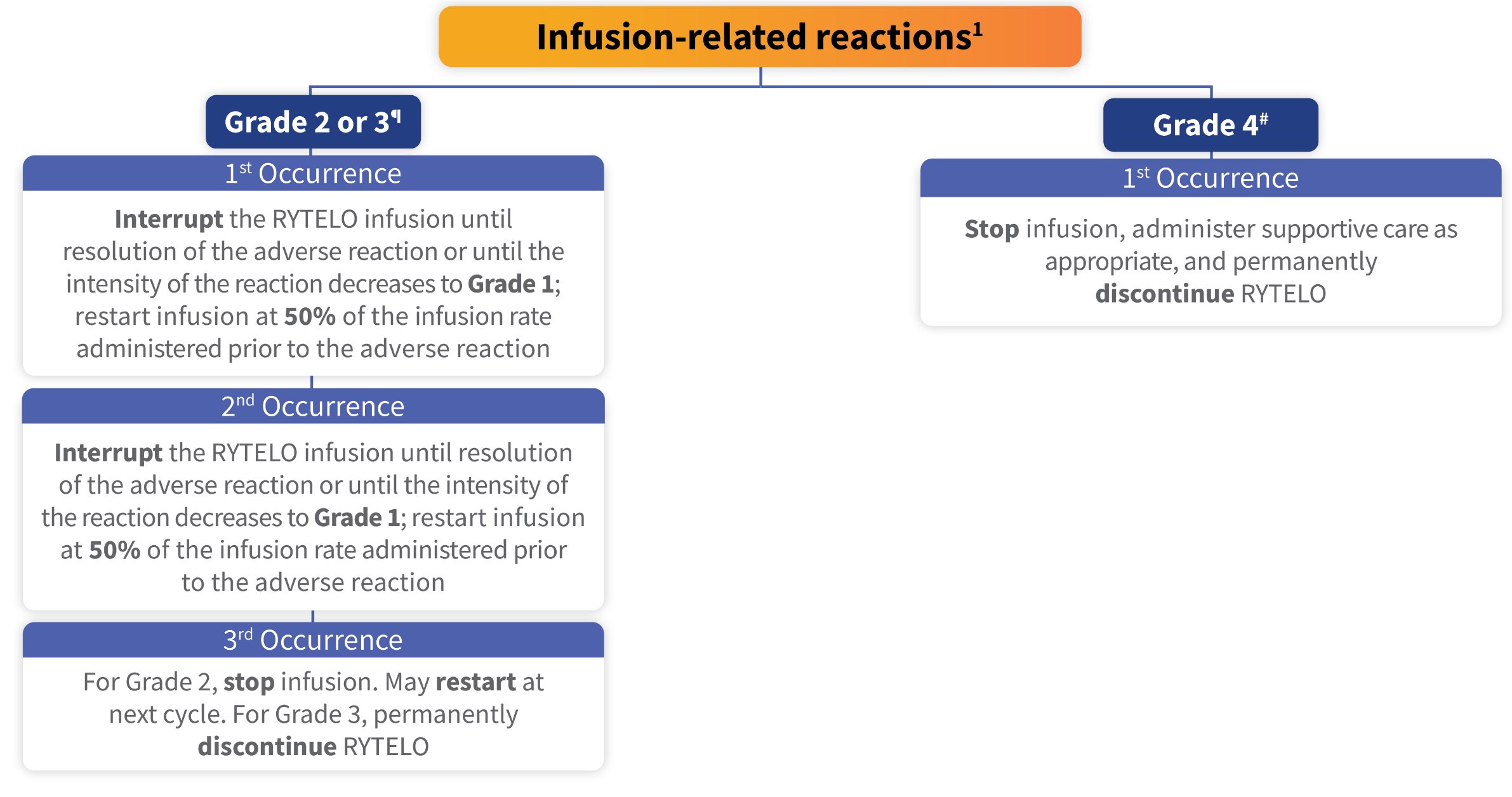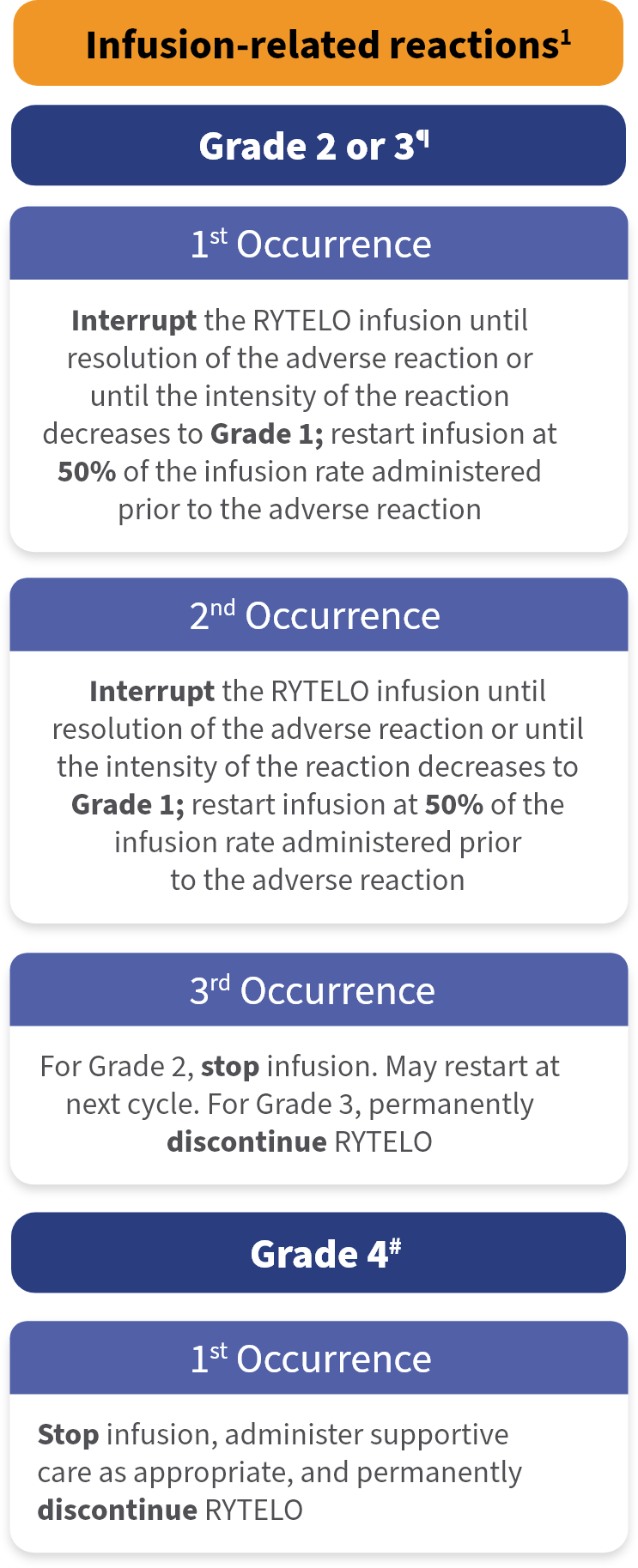Are you a US healthcare professional?
INDICATION
RYTELO® (imetelstat) is indicated for the treatment of adult patients with low- to intermediate-1 risk myelodysplastic syndromes (MDS) with transfusion-dependent anemia requiring 4 or more red blood cell units over 8 weeks who have not responded to or have lost response to or are ineligible for erythropoiesis-stimulating agents (ESA). See more
Most patients who experienced adverse reactions were managed with dose delay and/or reductions1
Temporary dose delay, dose reduction, or treatment discontinuation may be required to manage TEAEs1
Dose delay
- 68.6% (n=81) of patients receiving RYTELO had a dose delay due to TEAEs vs 23.7% (n=14) on placebo2
NOTE: Length of dose delay is patient dependent and may vary.
Dose reduction
- 49.2% (n=58) of patients receiving RYTELO had a dose reduction due to TEAEs vs 6.8% (n=4) on placebo2
- Administer supportive care, including growth factors and anti-infective therapies for treatment or prophylaxis for neutropenia and platelet transfusions for thrombocytopenia as appropriate1
- 15% (n=17) of patients receiving RYTELO discontinued treatment due to ARs1
- 7.6% (n=9) of patients discontinued due to thrombocytopenia and neutropenia vs 0% on placebo2

Recommended RYTELO dose reductions for Grade 3 and Grade 4 adverse reactions1
View content


NOTE: RYTELO should be permanently discontinued if the patient cannot tolerate the lowest dose level of 4.4 mg/kg.1
Dose modifications for patients with hematologic adverse reactions1,*
View content
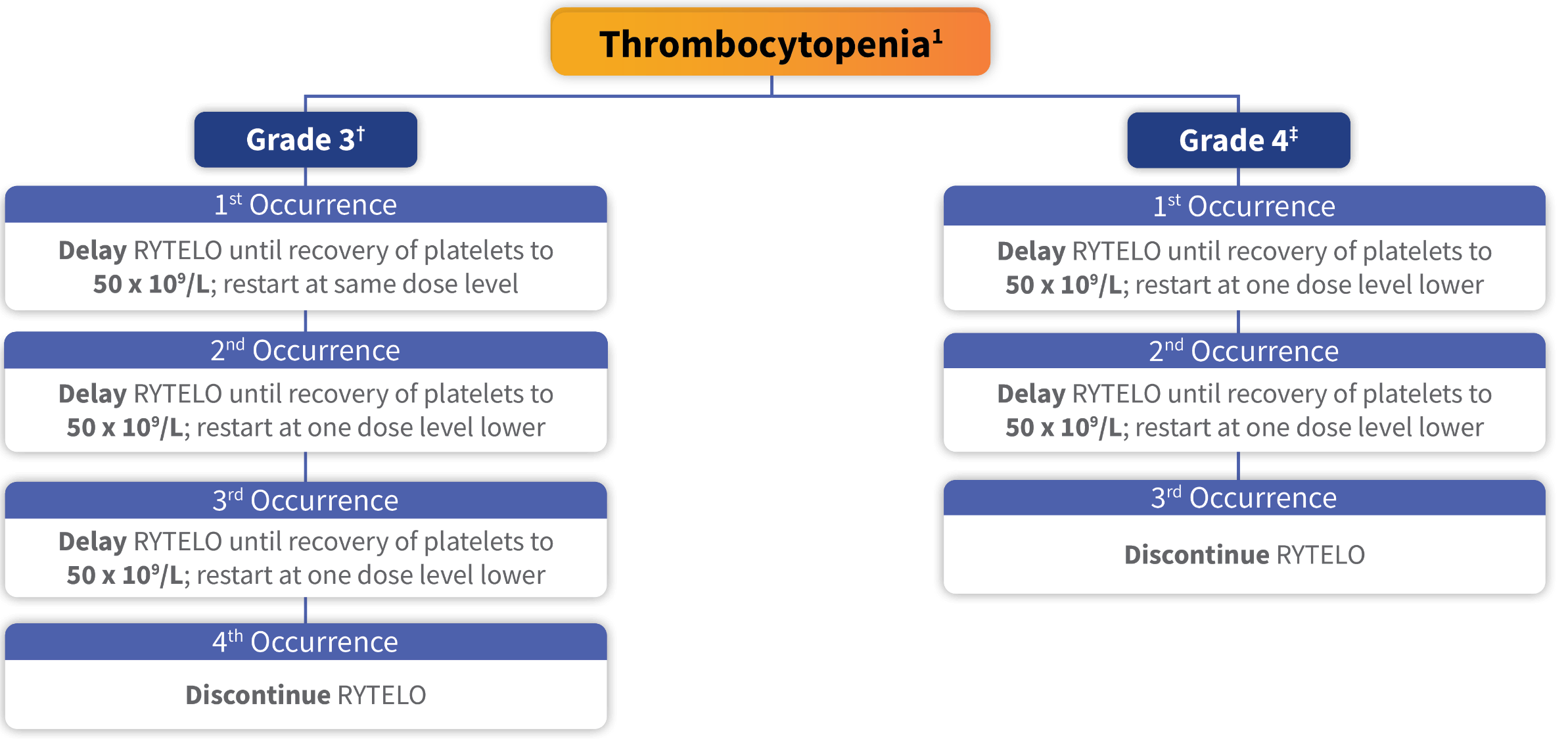
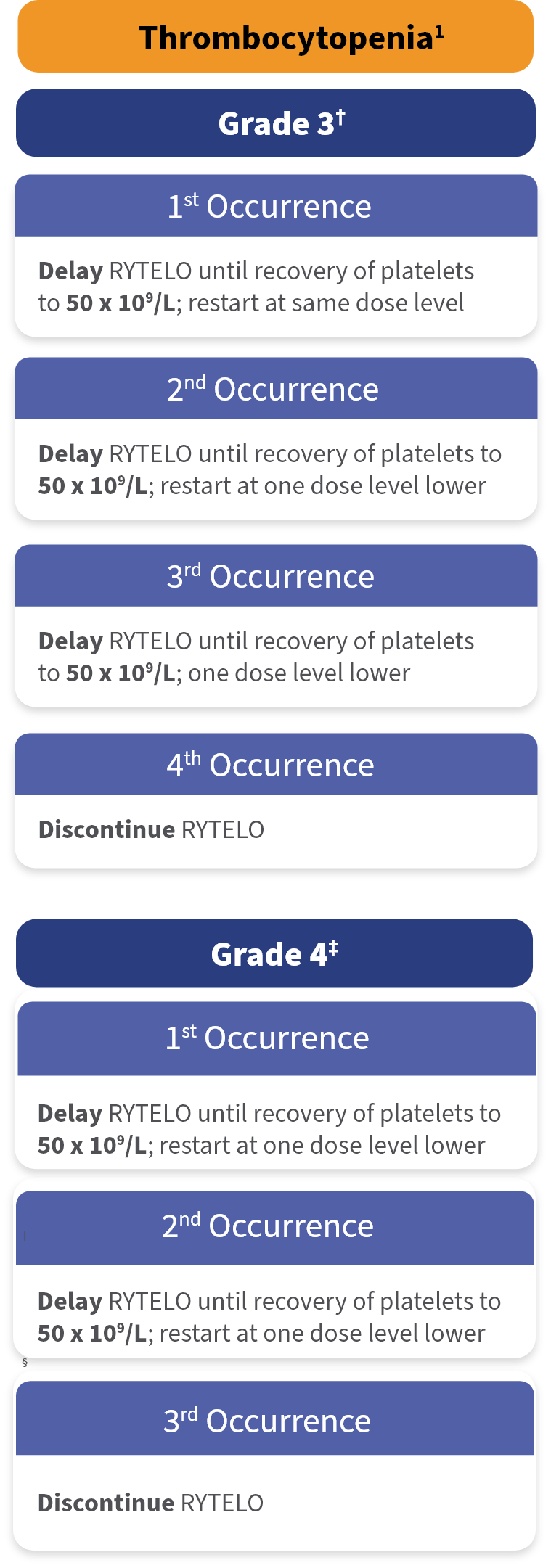
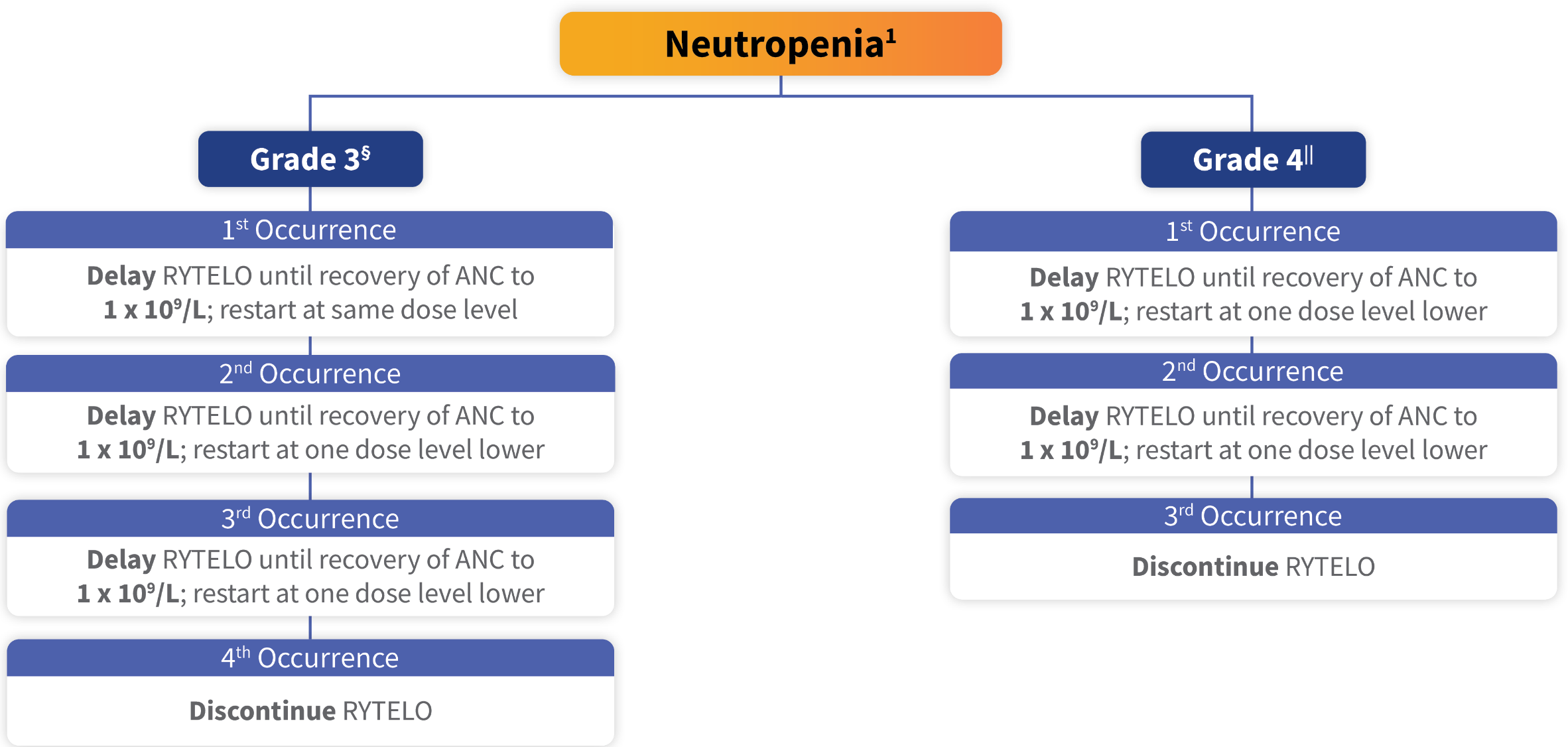
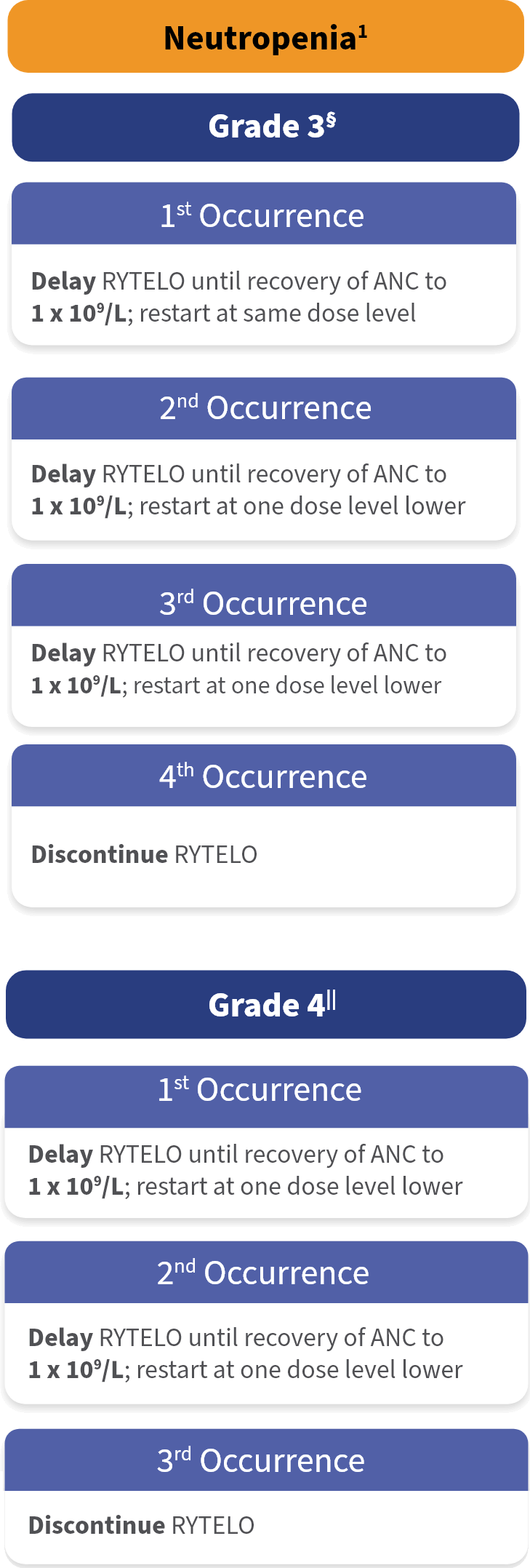
ANC, absolute neutrophil count.
*Severity based on National Cancer Institute CTCAE Version 4.03.3
†Grade 3 thrombocytopenia defined as platelet counts <50-25 x 109/L.3
‡Grade 4 thrombocytopenia defined as platelet counts <25 x 109/L.3
§Grade 3 neutropenia defined as neutrophil counts <1-0.5 x 109/L.3
||Grade 4 neutropenia defined as neutrophil counts <0.5 x 109/L.3
Dose modifications for patients with non-hematologic adverse reactions1,*
View content
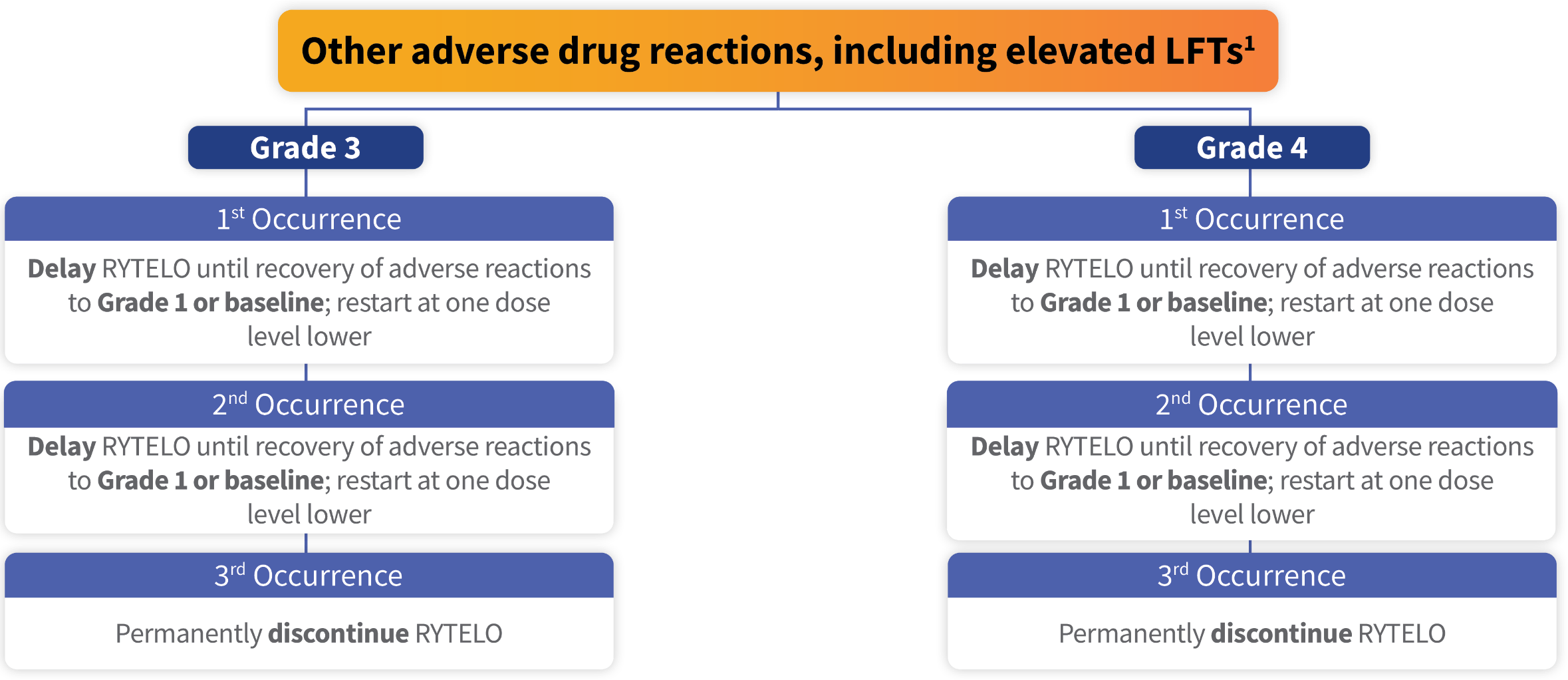
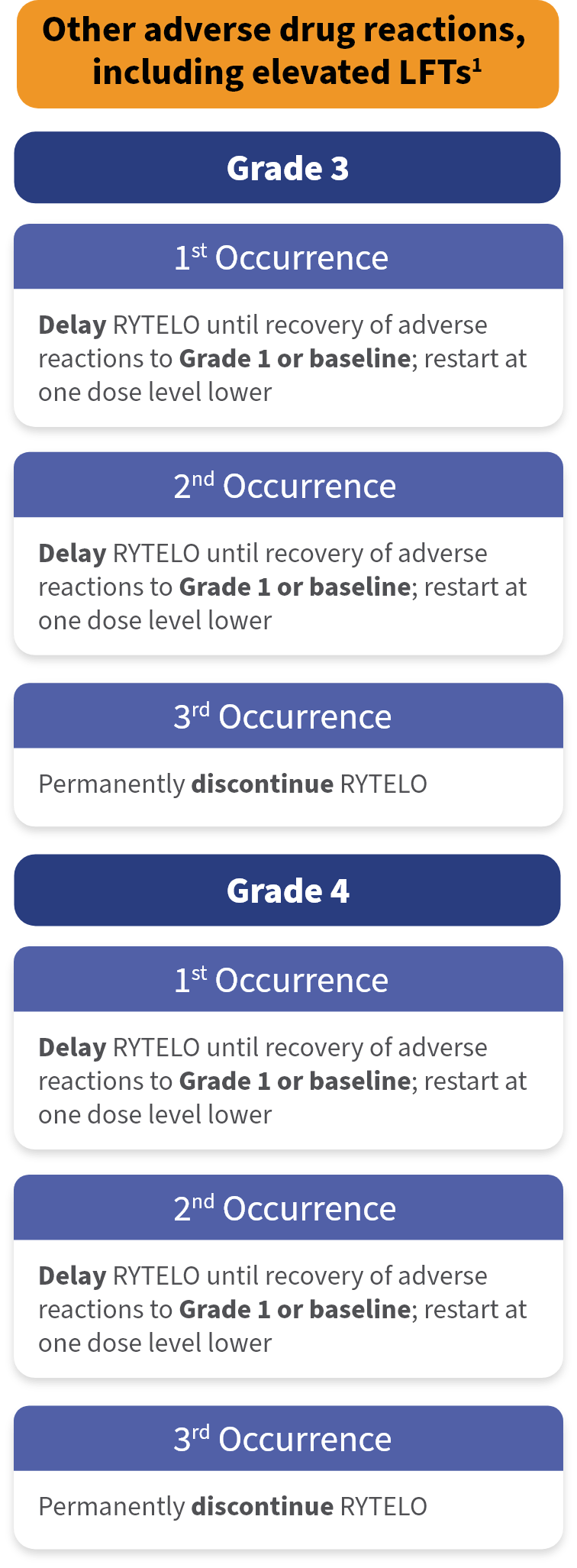
*Severity based on National Cancer Institute CTCAE Version 4.03.3
¶Grade 3 infusion-related reactions defined as prolonged recurrence of symptoms following initial improvement.3
#Grade 4 infusion-related reactions defined as having life-threatening consequences with urgent intervention indicated.3
ANC, absolute neutrophil count; AR, adverse reaction; CTCAE, Common Terminology Criteria for Adverse Events; LFT, liver function test; TEAE, treatment-emergent adverse event.
References: 1. RYTELO. Prescribing information. Geron Corp.; 2024. 2. Data on file. Geron Corporation. Foster City, CA. 3. US Department of Health and Human Services. National Institutes of Health. CTCAE v4.03. June 14, 2010.
INDICATION
RYTELO® (imetelstat) is indicated for the treatment of adult patients with low- to intermediate-1 risk myelodysplastic syndromes (MDS) with transfusion-dependent anemia requiring 4 or more red blood cell units over 8 weeks who have not responded to or have lost response to or are ineligible for erythropoiesis-stimulating agents (ESA).
IMPORTANT SAFETY INFORMATION
WARNINGS AND PRECAUTIONS
Thrombocytopenia
RYTELO® can cause thrombocytopenia based on laboratory values. In the clinical trial, new or worsening Grade 3 or 4 decreased platelets occurred in 65% of patients with MDS treated with RYTELO.
Monitor patients with thrombocytopenia for bleeding. Monitor complete blood cell counts prior to initiation of RYTELO, weekly for the first two cycles, prior to each cycle thereafter, and as clinically indicated. Administer platelet transfusions as appropriate. Delay the next cycle and resume at the same or reduced dose, or discontinue as recommended.
Neutropenia
RYTELO can cause neutropenia based on laboratory values. In the clinical trial, new or worsening Grade 3 or 4 decreased neutrophils occurred in 72% of patients with MDS treated with RYTELO.
Monitor patients with Grade 3 or 4 neutropenia for infections, including sepsis. Monitor complete blood cell counts prior to initiation of RYTELO, weekly for the first two cycles, prior to each cycle thereafter, and as clinically indicated. Administer growth factors and anti-infective therapies for treatment or prophylaxis as appropriate. Delay the next cycle and resume at the same or reduced dose, or discontinue as recommended.
Infusion-Related Reactions
RYTELO can cause infusion-related reactions. In the clinical trial, infusion-related reactions occurred in 8% of patients with MDS treated with RYTELO; Grade 3 or 4 infusion-related reactions occurred in 1.7%, including hypertensive crisis (0.8%). The most common infusion-related reaction was headache (4.2%). Infusion-related reactions usually occur during or shortly after the end of the infusion.
Premedicate patients at least 30 minutes prior to infusion with diphenhydramine and hydrocortisone as recommended and monitor patients for at least one hour following the infusion as recommended. Manage symptoms of infusion-related reactions with supportive care and infusion interruptions, decrease infusion rate, or permanently discontinue as recommended.
Embryo-Fetal Toxicity
Based on animal findings, RYTELO can cause embryo-fetal harm when administered to a pregnant woman. Advise pregnant women of the potential risk to a fetus. Advise females of reproductive potential to use effective contraception during treatment with RYTELO and for 1 week after the last dose.
ADVERSE REACTIONS
Serious adverse reactions occurred in 32% of patients who received RYTELO. Serious adverse reactions in >2% of patients included sepsis (4.2%), fracture (3.4%), cardiac failure (2.5%), and hemorrhage (2.5%). Fatal adverse reactions occurred in 0.8% of patients who received RYTELO, including sepsis (0.8%).
Most common adverse reactions (≥10% with a difference between arms of >5% compared to placebo), including laboratory abnormalities, were decreased platelets, decreased white blood cells, decreased neutrophils, increased AST, increased alkaline phosphatase, increased ALT, fatigue, prolonged partial thromboplastin time, arthralgia/myalgia, COVID-19 infections, and headache.
Please see full Prescribing Information, including Medication Guide.
You are encouraged to report adverse events related to Geron products by calling 1-855-437-6664 (1-855-GERON-MI) (US only). If you prefer, you may contact the US Food and Drug Administration (FDA) directly. Visit www.fda.gov/MedWatch or call 1-800-FDA-1088.

